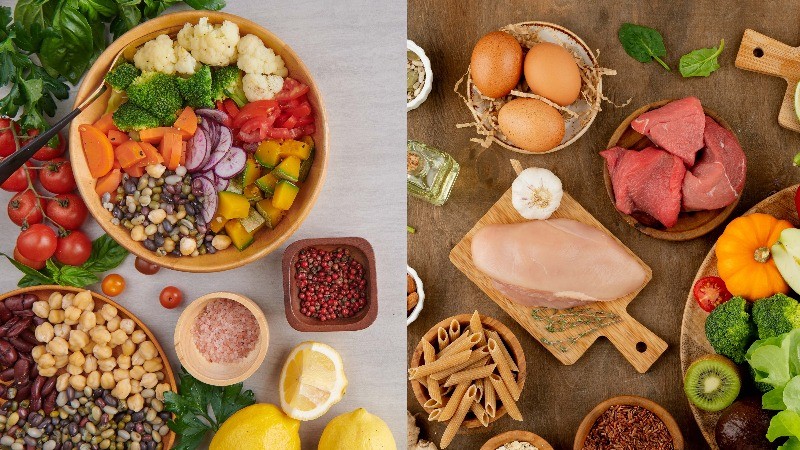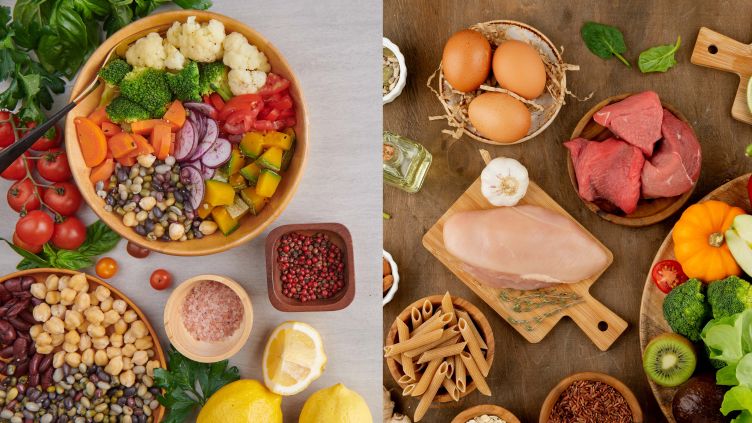
India is legit blessed when it comes to culinary delights. However, the veg vs. non-veg debate still continues. Some people love to eat, and they actually live for it. While some become choosy about their health, or adhere to a fixed diet due to cultural and religious practices. Although it is an individual's needs and preferences, which kind of food to consume, is there really a kind that one should opt for, which is good for health? Can non-veg only fulfill the protein requirements of the body, providing you with essential amino acids? Let's seek answers and debunk the myths associated with it.
There is a dividing line in India when it comes to food consumption. The northern states, including Punjab, Haryana, Uttarakhand, Rajasthan, Gujarat, Himachal Pradesh, Madhya Pradesh, and Uttar Pradesh, are predominantly vegetarian. While the line from the East to the southernmost part of India, spanning Nagaland, Chhattisgarh, Odisha, West Bengal, Jharkhand, Tamil Nadu, and Kerala, people are more inclined towards an animal-based diet. This differentiation is largely due to geographical factors (depending upon the climate and resource availability), religious beliefs, and prevalent cultural practices. Caste system, social hierarchy, as well as socio-economic factors, also influence food consumption in the country.
_686f612125e57.jpg) Amardeep Singh Pathania (posing left with Sachin Tendulkar)
Amardeep Singh Pathania (posing left with Sachin Tendulkar)
According to nutritionists, a plant-based diet can prevent heart disease, type 2 diabetes, and some other types of cancers, along with weight management and improved digestion. It has low saturated fat and high fiber. While the non-vegetarian foods provide vital nutrients like amino acids, Vitamin B12, iron, and omega-3 fatty acids. A vegetarian diet might lack these nutrients. Instead of regarding any one diet as better, there must be a 'balanced diet'.
But the question is, which diet is better? Amardeep Singh Pathania, Retired Customs Officer and BCCI Umpire, states, "The debate makes no sense. Because there is no better. And people choose according to their culture and family traditions. You cannot convince a vegetarian to eat fish or eggs. But he can have a plant-based diet that fills his nutrient potion."
Should you eat non-veg?
As mentioned above, some vital nutrients can be consumed by eating non-vegetarian food. Therefore, one can incorporate foods like lean meat, salmon, and some poultry into their diet.
_68709aa662bc9.jpg) Jayesh Acharya, Vikram Awardee and Former Secretary General of the Madhya Pradesh Table Tennis Association
Jayesh Acharya, Vikram Awardee and Former Secretary General of the Madhya Pradesh Table Tennis Association
Jayesh Acharya, Vikram Awardee and Former Secretary General of the Madhya Pradesh Table Tennis Association, affirms, "You see, there are other aspects to this. If humans stop eating non-veg, it will affect the food cycle and further lead to an imbalance in nature. It is necessary to maintain that. More so, how much does one's body demand? If a particular nutrient requirement, such as Vitamin B12, can be fulfilled from animal-based intake, then he must have it."
Amardeep Singh Pathania, who has represented the Madhya Pradesh State Cricket Team across all formats, says, "It's not that only non-veg can fulfill all the nutritional requirements. A plant-based diet including green vegetables, cereals, sprouts, combined with fruits, can do the needful. But one can surely have boiled eggs, as they largely fulfill the protein requirement."
Athletes have a diet that combines both plant- and animal-based foods, providing them enough energy and supporting their training and performance. But it differs according to the sport.
Jayesh Acharya states, "A sportsperson's diet depends largely upon his energy requirements and his competitive level. It has enough carbohydrates, proteins, fats, and vitamins, with proper hydration."
Pathania says, "The dietary intake of the sportsperson is closely monitored by his nutritionist/dietician. If someone is a vegetarian, their diet chart is prepared accordingly. It is ensured that the diet is according to their fitness levels and nutritional requirements."
 A combination of vegetarian and non-vegetarian foods can serve as a healthy option (Image source: Freepik)
A combination of vegetarian and non-vegetarian foods can serve as a healthy option (Image source: Freepik) When there is a choice to eat one, can an individual include both instead? The goal is a balanced diet that ensures fitness and overall health.
Pathania adds, "My only appeal to the sportspersons is to avoid eating starch and cholesterol-building foods. One should avoid foods that are very oily and contribute to excessive fat intake. It becomes a preference with time, but for good health, it is better to do this early on."
While Jayesh Acharya says, "Ultimately, it is an individual choice. But one shall ensure that there is a combination of the most essential nutrients, whatever you eat. The body's requirements must be fulfilled."
There is no reason to believe that this is better than the other. However, one must surely have a balanced diet, which is composed of the essential nutrients. It is the only way to better health!